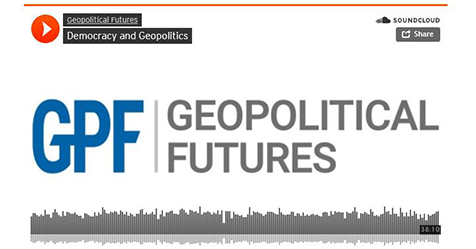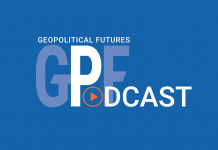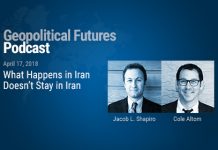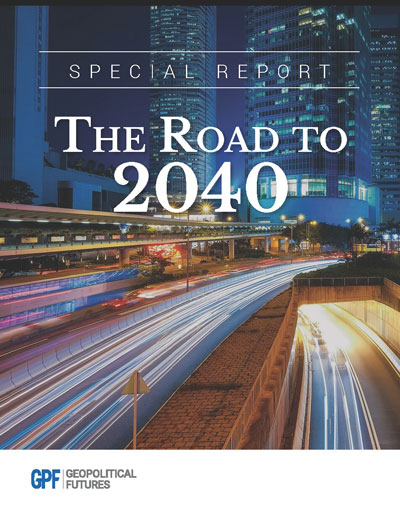Jacob L. Shapiro: Hello everyone and welcome to another Geopolitical Futures podcast. It’s a beautiful day here in Austin, Texas. I think we’re going to hit 100 degrees Fahrenheit. Kamran, how’s it going in Washington?
Kamran Bokhari: It is hot and muggy here, Jacob.
JLS: Well we are going to try and cool things down here with a little bit of a podcast. So, we’ve been experimenting with different kinds of podcasts of late. Sometimes we go around the world and sort of talk about the week in geopolitics. We’ve been doing some interesting stuff about history and contingencies especially in old military battles lately.
Today, Kamran is joining us on the podcast because Kamran has been thinking about democracy, one of those topics that I think everybody talks about and maybe people don’t understand quite as well as they think they do. Obviously the most famous quote about democracy is the one that is ascribed to Winston Churchill when he said that democracy is the worst form of government except for all those other forms that have been tried from time to time.
So we don’t exactly know where we’re going to go in this conversation quite yet. This is more going to be a conversation and opportunity for Kamran and I to talk out some of the things that he’s been thinking about and struggling with in his analysis and hopefully that will be useful to our audience listeners. I will say that this type of stuff, the relationship between ideology and between the form of government and then how that relates to geopolitics which really thinks a lot more about things like geography and interests and things that are hardwired into the system rather than things like forms of government that can change is a constant struggle for anyone who is trying to understand international affairs or who is trying to understand geopolitics.
So I don’t expect us to come up with some kind of answer here or even conclusion. But maybe we’ll raise some of the right questions. So Kamran, tell me and tell the audience a little bit about what you’ve been thinking about lately and what’s been tripping you up.
KB: So Jacob, I’ve been really fascinated by the sort of duality when it comes to democracy. So on one hand, we in the West, we love democracy. It’s a norm for us. It’s a cherished value. It’s not just a political system that provides for stability and economic development and improvement. It’s something that we live by. It’s almost religious for us.
But if you contrast that with the view of the democracy, say, sitting in Moscow or Beijing or Tehran or any of the other hostile hotspots in the world, they look at this and they say this is a weapon that the West uses to undermine our regimes. They think of colored revolutions, they think of CIA-backed uprisings, Ukraine being the most prominent of the point of view of the Kremlin. So, I find it really fascinating that something is both a value and a weapon at the same time.
JLS: Yeah, let’s let that develop in the oven a little bit more. So it’s a value. It has become a value that’s for sure, and it certainly can be interpreted as a weapon. But ultimately what it is, is a form of government and when you talk about countries like a China or a Russia and you think in terms of their approach to democracy, I think one of the things that you have to keep in mind is that in these places that democracy is dangerous and in fact, I would say that in most places democracy is dangerous.
That Churchill quote that I said at the beginning I think gets brushed aside and is sometimes used as a joke. But I mean one of the things Churchill was saying in that quote was that democracy is incredibly problematic. The rule of the people without any kind of constraints quickly becomes the rule of the mob and pretty much every political theorist in the history of humankind has been worried about what happens when you turn over political authority to a large group of people that the people themselves get to decide.
So even in a country like the United States, which has a certain set of what we call liberal values and which in recent decades has tried to use those liberal values to expand its own definition of the national interest. At the same time, even the United States, when you read the founders and when you read the Constitution, when you think about the Federalist Papers, the United States was founded as a republic not as a straight democracy and if the United States had been founded as a democracy, I am not sure that the political project would have worked.
The thing I always come back to with this, one of the major mistakes that the United States made when it was trying to rebuild Iraq, the United States almost misunderstood itself and misunderstood its own beginnings. It thought that if it gave equal voice to Sunnis, Shiites and Kurds based on their segment of the population that democracy was just going to carry the day and everything was going to go fine. Obviously, that didn’t happen. In Iraq, democracy was a recipe for civil war and for the birth of ISIS. That’s not the United States thinking about democracy as a weapon at all. That’s the United States thinking that democracy is the healing salve for all problems.
So I think it’s a little more complicated than that. To think of it in terms of a weapon and to think of it in terms of China and Russia are against it but the United State is for it, I always have to complicate that a little bit because the United States is not as democratic as sort of the vulgar explanation of the United States is. And for China and Russia, I think there are elements of democracy in China and Russia for sure and at the other end of that spectrum is that they are trying to preserve a sense of regime stability and greater good. That’s not that different from what is happening in the West either. How would you respond to all of that?
KB: I think you raise a fair point and I don’t disagree with you but I’d like to take this to the next level and I would say that, I look at it in terms of how much control do you have over or does one civilization, one country have over the democratic process versus another. So on one hand, democracy in the United States is something that’s tried, tested. There are mechanisms that have been in place for over 200 years and they continue to be improved upon and so it’s become something that’s known as synonymous with stability and prosperity.
But when countries like Russia, China, Iran and others look at it and they say this is a recipe for disaster because what they have in mind is regime preservation and when we say regime preservation, it could be ideological purity, it could be that as well as the desire to see a particular elite remain in power, the incumbent system maintain its hold over people.
If you look at it from the point of view of political freedoms, these systems – the Chinese, the Russian and the Iranian and the like – they see this as very subversive, as something that is infectious and it will turn their people against their regime and that dynamic is somehow manipulated by the United States and other Western countries.
So I got thinking and I said, though it’s very interesting that on one hand these civilizations, these nations look at it and say, these political freedoms are a bad thing, it’s something that will subvert whereas political freedoms have been internalized in the West where it doesn’t affect or it doesn’t have that subversive nature. Political freedom in the United States and in the wider Western world is a source of strength as opposed to weakness.
JLS: Yeah I am going to push back a little bit there Kamran because I see what you’re saying. The relationship between the form of government and the actual physical geographic entity is a good one to raise. Is the United States a republic and a democratic republic because it was a settler nation that the settlers came to and were able to create sort of out of nothing and the way they wanted it? And is say a Russia or a China or Iran all of those countries are large countries with very difficult geographies to govern with a lot of different ethnolinguistic groups and religious groups and everything you could possibly imagine.
We don’t think of those countries that way, we think of Russia as everybody’s reading Tolstoy and we think of China as just the Han Chinese and we think of Iran as Ancient Persians but if you actually look at ethnic maps of all those countries, when they’ve been empires, they’ve subsumed large numbers of different groups. And if you’re going to give democratic rights to the entire society, you risk undermining the stability of the system, like you said.
But the thing I would push back on is you say they would look at it in terms of infectious and I really would hesitate to use that language. It almost breaks into not being objective because again if you go back and you read the Federalist Papers or even if you read Locke and the people who inspired the Federalist Papers, those theorists were afraid of people. They set up systems of government specifically because they understood that or they thought that democracy was destabilizing. When a China or a Russia or an Iran are trying to accomplish things for the greater good of their society and they see democracy as something that can hinder that, they’re not wrong.
You know, right now in the United States, we’re in a battle royal for health care which has been a battle for so long. And one of the problems of health care is that it’s a huge hot button topic. It’s incredibly complex. Everybody cares about it and has a different agenda. Somebody who is 70 years old is going to have a completely different priority than somebody who is 50 years old, is going to have a completely different priority than somebody who is 30 years old. And the way the United States system is set up is to create a very inefficient system so that no one group can dominate. There is something to be said for the greater good and governing from a place of the greater good even if that means less democracy or individual rights.
And the other thing I would just throw at you is to say that even in the Western world, there has always been a difference in the conceptualization of these types of ideas. I am grossly oversimplifying here but continental Europe I think of really in terms of Rousseau and more of collectivism, and a lot of that has to do with the national will and what is best for the nation and there’s a social contract.
But there is also an expectation that the government will do what is best for everyone whereas in Great Britain and the United States that became much more focused on an attention to individual rights. And obviously the collective will was still important but not in the same way that it was in continental Europe and I think if you watch the development of democratic politics or just politics in general in continental Europe versus say in the United Kingdom, in Australia, in the United States, it’s different. And even there, we can talk about geography and how maybe something about how being island nations or settling nations and stuff like that affects things.
So, I would just caution us from going to the value level statement because so many of those things are dressed up in language that is designed to make people feel things. But at the same time all of this is coming down – and I am not creating a moral equivalency, I don’t think there’s a moral equivalency and am not a nihilist – I don’t think that everyone is the same morally. But I do think that this idea that ok well the West is completely democratic and a country like Russia or a country like China sees democracy as completely infectious and as a weapon, I don’t know, I begin to hesitate a little bit when I hear that kind of talk.
KB: I guess I am not disagreeing with you. What I am trying to say here is that in the Western world, we have come up with mechanisms to manage dissent whereas in these other parts of the world, dissent is negative. So new ideas are seen as hostile. I mean let’s look at the United States. Homosexuality as a concept, as an idea, as a way of life, you know we have now incorporated it through various means and I don’t mean to say that the debate is over, far from it. But it’s something that we have accepted as a reality of life and we have now tried to find ways in which to have that form of sort of dissenting view of how the majority of people conduct themselves in sexual terms.
Now if you compare that with let’s say other places, there’s a big uproar in Chechnya and the Chechen government is a Muslim-led government but it’s not Islamist, it’s very pro-Kremlin and yet they’re cracking down on homosexuality as if it’s something to be afraid of and to suppress. So I am looking at sort of how different systems manage dissent, allow for political freedom, allow for new ideas. New ideas are not necessarily seen as negative and detrimental and an existential threat so I think that is sort of at the heart of what I am trying to compare and contrast here.
JLS: I hear you but again I’ll push back and say, yes so in the West, there’s certainly more freedom of expression and certainly today, there are better ways to express dissent. That is certainly an ideal that the West has tried to live up to but other forms of managing dissent in the Western world or other examples of managing that dissent could be the United States Civil War in which over half a million soldiers died not even counting all the civilians. World War I, World War II, we could even throw the troubles in the United Kingdom not so long ago in there. That wasn’t the type of managing dissent that you are talking about and the notion of different ideas.
So freedom of expression is one thing but even in the West when you have groups that are demanding rights or privileges that a central government doesn’t want to give them, you are still having violent clashes. It’s not like these things don’t happen in the West.
KB: You are absolutely right. I mean if you look at the issue of racism and this latest incarnation in the form of Black Lives Matter, that movement. So I get what you’re saying. I am not saying that everything is hunky-dory and things are very smooth. There are bumps but I am looking at it in terms of whether we in the West look at these things as existential or do we welcome dissent and we say, okay, let’s figure out a way to internalize this. How can we use the existing parameters of our political system? How can we manage this? How can we allow for these differences to coexist?
I mean look at immigrants. One of the biggest things is immigration these days and how immigration could potentially subvert countries. So the French are very worried about the French Republic and the effects of immigration and how 10, 20, 50 years from now, what will the French Republic look like? We have the same concern in the United States. At the same time, in Britain and places like Canada, we have the idea of multiculturalism and ok you know immigrant communities, they come in, they accept the mainstream culture but they also retain some of what they came in with. I mean those cultural norms and values and somehow it gets integrated into the larger whole.
You contrast that with a country like Saudi Arabia or a country like Iran and China. Again, I go back to the usual suspects but you don’t see that same sort of, okay, let’s figure out a way on how to manage these different peoples. I am not saying it’s black and white but I can’t help but sort of recognize that on one hand, I am not saying there’s no discomfort in the West. Discomfort exists but the discomfort does not equate to the sky is falling. In these other non-Western systems, it’s a very existential threat. These are things that are seen as hostile to the very existence of the nation.
So women can’t drive in Saudi Arabia. I mean driving has nothing to do with a particular norm but it’s seen in power relations. It’s seen as the current elite whether it’s tribal or whether it’s religious or both. They see this, that if they allowed women to drive, then somehow the world as they know it would change and they would lose power. So I am looking at this as more of a power dynamic in the sense that, power is not maintained, stability is not maintained. But it will be lost.
JLS: Well for our listeners right now, I’ll just point out that so we’ve talked about homosexuality, immigration and women’s rights already, so I am sure we’ve pissed some people off already. I think those are the things you are not supposed to talk about when you are trying to make friends with someone, right? But joking aside, Kamran you put a lot in the oven there.
I think an interesting way to pivot from what you’re saying is to think about the relationship between the forms of government you are talking about and power because I think one of the ways that I would also push back at you is to say that a lot of what we’ve discussed right now, when you’re thinking in terms of geopolitics, doesn’t matter that much, right? So you know, you’ve talked a little bit about democracy and sort of the double-edged sword of it.
But I think you also at least alluded to earlier in our conversation that you thought that democracy created stable political regimes and you thought this increased power. And I don’t know that I necessarily agree with that. I think that power probably is based a lot more on geographic advantage and things like economic assets and military assets and, as the last couple podcasts we’ve done on military battles focused on, maybe sometimes just some dumb luck. I mean, we like to think that there is a rhyme and reason to the universe that is based on reality but one of the things that we track all the time is that well things work in terms of how things function and that ideology is really something that people use to justify whatever they are doing.
So Saudi Arabia – not a lot changes geopolitically for Saudi Arabia, whether women can drive or not. And no matter what the political ideology there is or not, what changes things for Saudi Arabia is their petro-economy with nothing besides oil to fund all the tribal affiliations and loyalties that they have to keep the regime together. And oil’s going down because the U.S. is pumping. And that’s the basic hard frame of Saudi Arabia; nothing’s really going to change that.
KB: I mean look again, we’re on the same page. I will say that yes it’s demography, geography, resources and how they interplay between those three that will shape geopolitical outcomes. There’s no disagreeing with that. It’s just at a lower level, slightly lower level, we have these other variables in play as well that really different peoples, if we can use that term, see very differently. And going back to dissent or political freedom, which is sort of the topic that we’re trying to unpack here today, we see that being received very, very differently and in very sharp and contrasting ways. And so I would say, I would sort of flip this and say sometimes, while in the West – and I started with this – that in the West, democracy is good, political freedoms are good, everybody should have them. And at the same time, it’s a way to essentially manage hostile regimes: North Korea, China, Russia, Iran and anybody else who’s hostile. But at the same time, there’s the flip side too and this is probably where you and I can begin to agree is that even from the Western point of view, outcomes matter.
So if democracy produces something that is hostile to the United States and to the West, then that’s not a good thing. So if you have elections that bring to power a group of people that are hostile to democracy as we understand it, they use elections to gain democratic means and power and then they turn around and they control that system and it was just a means to an end. From that point of view, yes democracy isn’t necessarily a weapon; it sort of cuts both ways but in a different way.
And so I am not saying that these are black and white things. That in the West, democracy is good and in the non-Western world, democracy is seen negatively. In the non-Western world, a lot of people, especially in the Third World, from their point of view, they’re very bitter when outcomes do not jive with or mesh with Western expectations. The West isn’t so eager to promote democracy. A lot of Egyptians will say, “Why is the United States supporting President Sissi who came to power through a military coup?” And so there is that dynamic as well. So yes, there is the weapon versus value. But I think that there’s far more to that as well and I think that we are kind of saying the same thing here.
JLS: Kind of but Kamran I disagree with you on a couple things that you have said so far and that didn’t convince me about some of the other things you’ve said. I think we agree on the geopolitics of some of these things but again like in a country like Russia, Vladimir Putin has very high popularity ratings and Vladimir Putin returned a sense of pride to Russia that wasn’t there before he came to power.
Xi Jinping in China is thought extremely well of. You can say whatever you want about him – about him centralizing control and his presidency and becoming a more authoritarian government – but the stuff about corruption is real. I mean he really is, on the one hand those are political purges but also like he is taking an aim at corruption.
The same is true about Duterte in the Philippines. When the West reports about him, it’s that he’s this loud mouth who says all these crazy things. But in the Philippines, he has a tremendous amount of appeal even though he has some of these quote, unquote authoritarian tendencies and again when it gets down to ideology for me, the more I think about this stuff and the more I say this stuff, the less it really matters.
I think that all countries and all people, need ideology to justify their systems of beliefs and the things that they do to protect their countries to themselves. I think that’s one of the main ways that ideology manifests itself. But I don’t think that there’s some sort of qualitative difference necessarily between a China and a Russia and a United States.
I think that geography determines a lot of the challenges and history determines a lot of the challenges that these places have had to come up with. And it’s interesting that democracy has become a value. It makes sense if you think back in history and go back to when the monarchies in Europe were falling apart and you had the Enlightenment going on and people thinking about the nation in new terms. You know, democracy made sense because basically the old system had been upended and that idea coming out of Europe was infectious, it really has spread all over the world. And the ideas of nationalism and the national collective will being most important really is the basis for the international political system, right?
So it is that democracy has become a value but in the sense that democracy has become a value, a country like China and a country like the United States actually share a lot more in common with what you’re putting forth in this argument. And again, democracy in a country like the United States, I am not sure that is the main reason there was stability in the United States. Ambiguity about democracy is sort of what led to the Civil War in the first place. I think a lot more has to do with economics and politics and military history and cultural values and things like that.
KB: That is true but going back the popularity of Putin, the popularity of Duterte and Xi Jinping, yeah I mean we can find evidence of their popularity. But I am pretty sure that, I mean these are societies in which – polls in general the world over, polls as Brexit has told us, as the recent U.S. election has told us, polls are unreliable.
JLS: Yeah but you can’t dismiss that point by saying polls are unreliable. When the numbers are that far ahead and like I mean yes, the Brexit polls were unreliable, that was like the margin was 52 to 48 or something like that and it was dancing around there. But like I don’t think it’s fair to cast aspersions on the type of polls that are being conducted in those senses because a Brexit vote was wrong.
KB: That’s not what I am saying. What I am saying is that while there will be evidence to suggest that Putin and Xi are very popular, I am pretty sure that we can find polls where people will and these two things may not contradict each other, there will be those who look at the West and say, “Well I’d like to be able to live like that, I’d like to be able to have that kind of prosperity, have those kind of freedoms, have that kind of lifestyle.” So those things go hand in hand, so there’s something to be said about that.
And therefore, they look at their own systems and say, “Ok these systems don’t provide us with that.” And this is sort of the globalization effect and the popularity at this point in history where the world over, people like things Western. I mean that’s the reality. Yes, they’re nationalistic; yes, they’re simultaneously very, very territorial about who they are and what their identity is and they’re religious and they’re nationalistic and they have ethnic values. But at the same time, we can’t dismiss the fact that the world over, people look at the West and say, “Well gosh I wish we had that kind of system here.”
JLS: The line “people like things Western” – I don’t exactly know what means. Certainly, people look up to the great powers in the world. You know that was Great Britain and that was the United States. But during the Cold War, some of the world liked the United States and some of the world liked the Soviet Union and there were even pockets in the West that liked the Soviet Union so I don’t know that I would reduce it that simply. But I would put back at you Kamran: so what does this have to say about geopolitics? What conclusion do you make about the relationship between nations based on the thing that you’re talking about?
KB: I think there’s an innate human desire to live in political economic terms that provide them with a better life. I mean there’s no denying that and I think that…
JLS: But that has nothing to do with democratic freedom necessarily.
KB: It may not necessarily. I would still argue that geopolitics as we discuss it internally and we converse with our audience and we say geopolitics is politics, military affairs, economics all in an integrated form. So I would say if we talk about the political realm, then we can’t just say democracy doesn’t shape the political level in which geopolitics operates. We do have autocratic regimes; they have their problems. I am not saying democracies don’t have their problems. They do. But there is a qualitative difference. And there’s something to be said about it and I don’t have a solid answer for our listeners.
But I can’t help but consider that there is a reality. Look at immigration patterns. People are not flying off to China. They’re not trying to go and live in Russia. Where are they coming? They’re coming to Europe. And that’s why we have an immigration problem. So, I think there’s something to be said about that.
JLS: There is and there is a qualitative difference between every nation. But I still am not clear on the leap you’re making from political ideology in terms of politics to national power. What is the relationship there that you are positing?
KB: I am just saying that there is something to be said about – and not necessarily calling it ideology or political systems. I am just saying that there is something about the West in general that people want to be like Western people. And sometimes they want to do that in their own context while remaining in Russia, remaining in China, remaining in Iran. And sometimes people just give up and say, “Ok you know what? I am just going to leave my place of birth and I am just going to go and try to find my way. You know, if I’m successful, good. If I am not, well we’ll live with that.”
So I am not necessarily making a connection here or elevating politics or ideology and saying that it’s different from geopolitics. I am saying that geopolitics is a function of these things. So when we talk geopolitics, I am saying that this is something we need to consider as well.
JLS: Yeah but Kamran what I am struggling with here is you’re talking about a very, very Western-centric view of the world. And then it’s not tying into any sort of explanation for the relationships between nations themselves. So I am just not clear about what you’re driving at so what is the point that you’re driving to at the end of all of this?
KB: I think that the point that I am making is that when we talk about geopolitics, when we step down one level and just talk about politics and even economics, I think systems do matter. And that’s what I am trying to say here. I don’t have a solid answer and as we said in the beginning, this is a topic that we’re trying to explore.
So I don’t necessarily have a definitive conclusion here on the role of politics, the role of ideology, the role of political systems. What I am just saying is that when we talk about geopolitics, I think these things have a role and it may not be as big or as small. I am just saying that there is a role and these various factors that we’ve been sort of discussing, they do shape geopolitics at the end of the day.
JLS: Well here we may just have to disagree because I think geopolitics shapes them. And this is something that I’ve written about before and I’ve said it before and I am sure people will write in and tell me what they think about what I am going to say here but I’ve always said that ideology comes after the kind of hard things that define political realities for me.
So I really don’t put a lot of stock in ideology. I think it’s important to understand ideology and there are times where if you want to understand a country’s national priorities or the way that it’s going to manage itself or its relationship with others, you need to understand some of the ideological underpinnings.
But I really do think that, what you have first is you have basic things like well how are we going to govern and how are we going to protect ourselves and how are all of these things going to work? And ideology gets grafted onto that and ideology is incredibly malleable and it can change depending on the situation.
And ultimately when we think about the relationships between nations, I think these ideologies generally speaking don’t have that much import. You know, Nazi Germany was a reprehensible regime. If I can remember the Churchill quote on that was, you know, most lamentable crime or something in the history of human crime or something was how he described Nazi Germany.
But when you look at Nazi Germany and when you look at Kaiser Wilhelm and German in World War I, it’s the same geopolitics at work there. It’s the same strategic interest that is driving Germany to go to war with the European continent because of the issue of Germany. And we can say that the issue of Germany is still not settled today.
It really doesn’t matter ideology-wise when we’re talking about the relationship between the United States and China. The United States is a democratic republic. China is nominally a communist country although as I have pointed out before Xi Jinping now wants to use supply-side reform so he basically wants to use Reaganomics to try and fix the economic problems of its own country. And China really hasn’t been a communist country since Deng Xiaoping opened up it in the 1970s and 80s.
What defines the relationship between the United States and China are things like the trade deficit, are things like the United States increasing imports of Chinese goods. On the one hand, that increases Chinese dependence on the United States because of how important trade is to their economy. On the other hand, that is bad for jobs and employment in the American middle class even though people can buy cheaper goods probably than they could otherwise from China. Those are the things that define the relationship between the United States and China and certainly both sides like to ding each other over the heads with their various ideological points.
But I don’t pay a lot of attention to that. And in general at GPF, we don’t pay a lot of attention to that because ultimately at the end of the day, that is the stuff that people say in order to justify what’s going on, on a much deeper level. And it’s that deeper substrate that we’re constantly trying to get to. And the thing about that is that ultimately every nation is different and every state is different and they behave in different ways.
But human beings are ultimately all human beings. So, on the one hand, you have to understand the differences between these things. But on the other hand, if you can understand the basic wants and needs of a human being, you can begin to tease out maybe how different political forms emerge in the different places that they did.
So maybe you need to sit with it and think with it a little bit more. But I would say that for me, I have a pretty well-defined – a lot of people talk about ideology and interests as chicken and the egg. For me it’s not a chicken and egg situation. At least to me, it’s very clear that interests and geography and things like that come first and that ideology gets grafted on afterwards and I spend much more of my time dealing with the former rather than the latter.
KB: I don’t disagree with you. I am just saying that from my point of view, ideas shape interests and vice versa and so I don’t how know much. I can’t quantify it. It’s something that I am not qualified to speak on. But I think that there’s a bit of more complexity and it’s a two-way traffic. I guess that’s what I am trying to say here.
JLS: Fair enough. Well I think Kamran, I think we’ll call it a day there. Thank you everyone for listening. We hope you enjoyed us sort of pulling the hood back up and me and Kamran batting things around a little bit and arguing. But as always, you can leave us commentary and feedback. You can just leave comments on Soundcloud here or you can email us at comments@geopoliticalfutures.com. We’ll be back next week probably with a little look around the world for the podcast. So I am Jacob Shapiro. This is Kamran Bokhari and we will see you out there. Thanks Kamran.
KB: Thank you.








 The Road to 2040
The Road to 2040